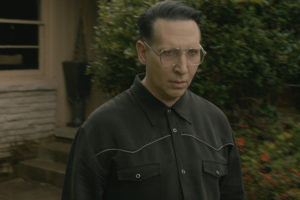[Published at Film Inquiry] Sam Hoffman is no stranger to quirkiness. The producer acted as first assistant director on Wes Anderson‘s The Royal Tenenbaums and The Life Aquatic With Steve Zissou and production manager and executive producer on Anderson‘s The Darjeeling Limited and Moonrise Kingdom. Humor Me marks the filmmaker’s directorial debut. Aside from directing a short and two television series, Hoffman is relatively new at the helm, entirely in control of a project. He does his part, providing an environment for his two seasoned stars, Elliott Gould and Jemaine Clement, that is conducive to optimal collaboration.
In Humor Me, Clement plays struggling playwright Nate Kroll. Once relatively well-known and an up-and-coming talent in the theater world, Nate can barely finish writing his latest work. Bored and out of love, his wife Nirit (Maria Dizzia) leaves him, taking his son with her. Broke and with no means of paying rent, Nate has no choice but to move in to his father, Bob’s (Gould) retirement community. There, he has some time to resolve his midlife crisis, realign his values, and bond with his father.
Humor Me contains a familiar plot line, story, characters, and themes; we’ve seen this one before, time and again. However, Clement and Gould‘s onscreen rapport and charm, a career-best dramatic performance from Clement, and some solid laughs save Humor Me from mediocrity.
The Midlife Crisis Formula
Man loses job. Man loses wife or girlfriend. Man is forced to downsize and reevaluate. While wounded, man meets similarly wounded women. Mutual healing and potential love ensues. Throw in a strained father and son relationship variable with some bickering and some bonding, and you have yourself a formulaic cliché, but harmless and often enjoyable film about an artist trying to make due in a society that no longer values the arts in the same capacity as it once did even 30 years ago. If one looks at the midlife crisis sub-genre, they may notice a trend that focuses on middle-aged men going through a dramatic life change far more than women. Recently, films such as Young Adult and Bad Moms are starting to explore the midlife crisis trope from a woman’s perspective.

source: Shout! Factory
So, what does Humor Me add to the midlife crisis formula? Most of the time in this kind of story, we see a hard-working person with a Type A personality who, despite doing everything seemingly right, receives the short end of the stick. It’s usually our main character against the world. In Humor Me, Nate is the opposite. He’s lazy, he doesn’t take care of himself, and the punishment seems to fit the crime. The aforementioned father-son relationship, though nothing innovative in the annals of storytelling, is rather refreshing to see within the context of a midlife crisis storyline, especially with Gould and Clement playing the respective parts.
The Strength Of Its Two Leads
Humor Me relies on the acting prowess of, comedic timing of, and organic interaction between Gould and Clement. Gould plays an easygoing, zen funnyman with a love for hard work that his son Nate hasn’t seemed to inherit. Contrarily, Clement‘s Nate is uptight, rigid, and over-serious; it’s not your run-of-the-mill “chip off of the old block” story, however, a father and son story in which the two generations clash is a tale as old as time. At least Gould and Clement make it enjoyable, and they’re provided with enough solid material by Hoffman.

source: Shout! Factory
The Oscar-nominated Gould‘s Bob constantly tells these jokes, through the eyes of a fictional man named Zimmerman, throughout the film as a means of communicating during difficult moments. Gould tells them with such dry wit as if he’s told them a thousand times before; the lines are delivered impeccably. Clement‘s American accent is quite good. Here and there, the New Zealander slips up and gives the audience a slight hint as to where his roots are. Both actors are known for their comedy, however, Gould and Clement both turn in rather weighty emotional performances.
Surprisingly Imaginative
Hoffman‘s envisioning of a New Yorker’s midlife crisis would be somewhat plain if it weren’t for the unique flashbacks, or cutaways, that he inserts during the Zimmerman jokes. As Bob recites these, sometimes lengthy, jokes, Hoffman uses a silent movie effect, depicting the story of the joke in black and white and a much smaller aspect ratio. It’s almost as though these continuous jokes, all with a common main character, Zimmerman (played by Joey Slotnick), create a story within the story in Humor Me. Credit goes to editor Paul Frank (Sleeping With Other People) as well for adding to the 16 frames-per-second feel. These segments in the film provide a welcome change of pace in an otherwise ordinary suburban New Jersey setting.

source: Shout! Factory
Nate has grown to despise the Zimmerman jokes that his father, a widow, always tells, as he feels as though it is a cop out for dealing with reality and the hardships and problems that come with it. One could consider Humor Methe independent, Jewish version of Big Fish; Albert Finney and Billy Crudup’s central relationship in that film closely parallel’s that of Gould and Clement in this film. In both films, the sons appear to resent their fathers on the outside, but actually yearn for their approval. They’re both mad at their fathers for never taking life as seriously as they’d like them to. Furthermore, in both instances, the directors, Tim Burton and Hoffman, take us on elaborate cutaways during the aging fathers’ stories and jokes, or allegories for life.
Humor Me: See It For Gould & Clement
If for nothing else, see Humor Me for the performances of Gould and Clement, both of whom convey admirable range. It’s a considerably modest film, earning only approximately $33,500 in theaters. Aside from playing at various Jewish film festivals across the Unites States, Shout! Factory only released Humor Me to a total of five theaters across the United States during its longer than three-month-long stint at the box office, which is unusual for a film starring such talent, including Dizzia (who is hardly in the film for five minutes). This isn’t the kind of film that you see for the spectacle, nor is it one you see for its ability to engage the brain significantly. It’s an easy, 93-minute viewing experience. One that’s more suitable for VOD platforms.
Thanks to the funny and occasionally moving performances of Gould and Clement and a confident feature film debut from Hoffman, Humor Me qualifies as a passable entry into the midlife crisis sub-genre.
Did you catch Humor Me? Are you a fan of Gould and Clement’s respective filmographies? Is there a recurring joke that’s been passed down in your family? Tell us you thoughts in the comments below!
Humor Me was released in the United States on January 12, 2018. It arrived on DVD, Blu-ray, and VOD on April 17, 2018. For all international release dates, see here.
Film Inquiry supports #TimesUp.
“The clock has run out on sexual assault, harassment and inequality in the workplace. It’s time to do something about it.” Read the Letter of Solidarity here. Make a donation to the legal fund here.








1 Comment
Leave your reply.